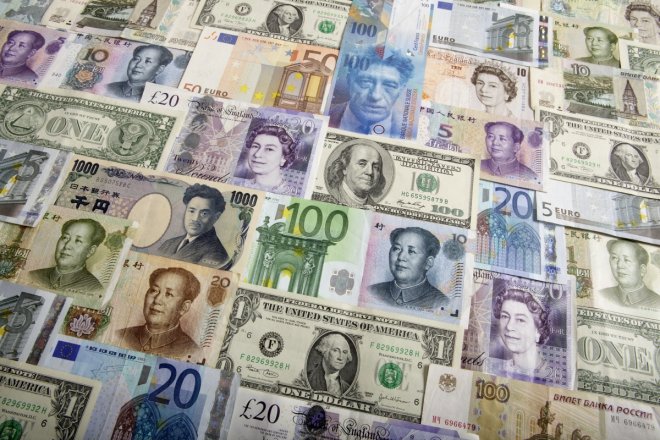
Asian currencies traded mostly flat and shares mixed on Monday (Feb 20) with the US markets shut for a holiday and no major data points to be weighed on the day other than Japanese trade balance and Thai GDP from the region.
The Thai baht traded at 34.99 at 9:35 AM Singapore time, unchanged from Friday's close but after swinging between 34.94 and 35.03. At the day's low for the pair, the baht was at its strongest since 9 November.
Thai GDP data for the fourth quarter is due on the hour. Markets are waiting for the year-on-year expansion rate for the quarter to ease to 3% from 3.2% while the full year growth rate to rise to 3.2% from 2.8% recorded in the third quarter.
So far this month, the baht has rallied more than 0.5% against the US dollar, adding to the 2.08% gain in January.
The Singapore dollar was at 1.4187/US dollar, steady from the previous close, and holding the 0.13% decline on Friday.
The Korean won was at 1,148, slightly stronger than last week's close of 1149.75, but after Friday's 0.76% slide.
The yen was also holding near Friday's close of 112.95/US dollar, which was a 1-week high for the Japanese currency.
Malaysian (+0.18%), Indonesian (+0.23%) and Taiwanese (+0.06%) stock indices were up at 10:15 AM in Singapore while China's Shanghai composite led the losers with a 0.85% decline. Singapore's STI was down 0.17% and Ausrtalian, Hong Kong and Japan indices were down more than 0.3%.
Data on Monday showed that trade balance of the world's third largest economy was a deficit of 1,087 billion yen in January, falling from a surplus of 641 billion yen and worse than the consensus of 636 billion yen deficit.
Exports growth slowed to 1.3% from 5.4% while imports expanded massively by 8.5% from a year earlier in January, rebounding from a decline of 2.6% in February.
Political uncertainties in Europe are weighing on euro but large long trade positions in the dollar are acting in the opposite direction, holding the EUR/USD pair little changed from Friday's close during early Asian hours.
The single currency traded at 1.0609, compared to the previous close of 1.0608 and following the 0.6% decline on Friday. The euro had fallen to a 1-month low of 1.0521 during last week.
Headlines from Germany and France are likely to impact the policy outlook for the single currency region, making them crucial for the days ahead.
Germany's center-left Social Democrats have moved ahead of Chancellor Angela Merkel's conservative Christian Democrats in an opinion poll by the Emnid institute for the first time since 2006, reports showed.
News on Friday from France was that the French left could unite behind one candidate in the presidential elections seemed to increase the chance of anti-EU, anti-immigrant Marine Le Pen winning, pushing down the common currency.
Fed Cues
In addition to more news on European politics, the market is waiting for key US Fed officials due to speak this week for additional monetary policy cues after the Fed Chair recently hinted at the possibility of sooner rate hikes by the world's largest economy.
The Federal Reserve will release minutes of its most recent policy meeting on Wednesday.
The U.S. central bank held interest rates steady following its meeting on February 1 and painted a relatively upbeat picture of the economy, although it gave no firm signal on the timing of its next rate move.
The Fed speakers this week in focus are Minneapolis Fed President Neel Kashkari and Philadelphia Fed President Patrick Harker, due to speak Tuesday, and Atlanta Fed President Dennis Lockhart, scheduled for Thursday.
Fed Chair Janet Yellen raised market expectations for a near-term rate hike last week after saying it would be "unwise" to keep interest rates lower for longer.








